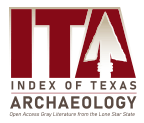Home > Research Projects and Centers > Center for Regional Heritage Research > Index of Texas Archaeology > Vol.
Article Title
Phase I Archaeological Survey of a 10-acre Habitat for Humanity Tract in Laredo, Webb County, Texas
Agency
Center for Archaeological Research
DOI
https://doi.org/10.21112/ita.2005.1.4
Abstract
On December 7, 2004, the Center for Archaeological Research (CAR) conducted a Phase I intensive pedestrian archaeological survey of a 10-acre portion of Tract 4 in the Las Blancas Subdivision located near Laredo in Webb County, Texas, for Habitat for Humanity of Laredo. The proposed development consists of the construction of low-income housing within this parcel.
Twenty shovel tests were excavated along 20-meter transects and in areas considered to have high or moderate probability of buried cultural materials. In addition, two backhoe trenches were excavated in alluvial deposits along the eastern margin of the project area overlooking Blancas Creek. The survey resulted in the identification of one archaeological site, 41WB633, an apparent lithic procurement locality.
Site 41WB633 covers approximately 6.4 acres and extends beyond the survey area. The core area with the highest density of surface materials measures approximately 65 x 45 meters and contains early reduction stage bifaces, cores, and lithic debitage scattered across the surface. Only one of the 20 shovel tests (ST 10) placed within the site recovered subsurface materials buried in Levels 1–3, at 0–30 cm below surface. Neither of the two backhoe trenches excavated within the boundaries of the site yielded subsurface materials.
The geoarchaeological investigations indicate that the prehistoric lithic artifacts show no evidence of alluvial or colluvial abrasion and only minimal patination was observed on a few pieces. This suggests that they are not the product of significant high-energy redeposition. Although the surface gravels may have been formed by colluvial or eolian processes, the fresh, undamaged edges of the lithics indicate that events concentrating the gravels probably occurred prior to deposition of the archaeological materials.
Given the lack of isolable archaeological deposits at 41WB633, the overall low density of cultural materials, and the absence of a comprehensive research context within which such lithic procurement sites can be interpreted, CAR recommends that the site does not merit designation as a State Archeological Landmark and does not warrant nomination to the National Register of Historic Places. Therefore, it is CAR’s recommendation that the construction work associated with the development of this 10-acre portion of the Las Blancas Subdivision proceed as planned.
Because the property was privately owned at the time of the fieldwork, and no state funds will be employed in the construction effort, no Texas Antiquities Committee permit was necessary for this undertaking. The artifacts collected during the survey will be curated at CAR unless otherwise requested by the landowner. All project-associated documents are curated at the Center for Archaeological Research at The University of Texas at San Antonio.
Creative Commons License

This work is licensed under a Creative Commons Attribution-NonCommercial 4.0 International License
Included in
American Material Culture Commons, Archaeological Anthropology Commons, Environmental Studies Commons, Other American Studies Commons, Other Arts and Humanities Commons, Other History of Art, Architecture, and Archaeology Commons, United States History Commons
Tell us how this article helped you.


